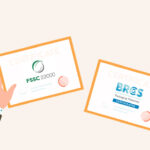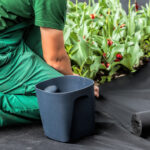Bulk bags, also known as Flexible Intermediate Bulk Containers (FIBC), are large, durable bags used for storing and transporting various goods. They are made from woven polypropylene fabric, which gives them strength and flexibility. FIBC bags can hold and transport items like grains, seeds, chemicals, building materials, and even pharmaceuticals.
Choosing the right bulk bag is important because different industries have different needs. For example, a construction company might need a heavy-duty bag for sand and gravel, while a food company might need a bag that keeps products safe and dry. Picking the right FIBC bag ensures the items stay safe during transport and storage.
This guide will help you choose the best bulk bag for your industry. We will cover the different types of industrial bags, key features to look for, and tips on finding a reliable supplier. By the end, you will know how to pick the right bulk bag to meet your needs.
Understanding Bulk Bags
Bulk bags are made from woven polypropylene fabric. This material is strong and durable, allowing the bags to carry heavy items without tearing. Bulk bags usually have loops at the corners, making them easy to lift with forklifts or cranes. Some bags also have spouts for easy filling and emptying.
Common Materials Used in Manufacturing
Polypropylene is the most common material used to make industrial bags. This plastic is light but very strong. It is also resistant to moisture, chemicals, and UV light, making it suitable for various environments. Some industrial bags may also have polyethylene liners to provide extra protection for sensitive items.
Typical Sizes and Capacities
FIBC bags come in different sizes and capacities to meet various needs. They can range from small, holding a few hundred kilograms, to large, holding up to 2,000 kilograms or more. The standard size of a bulk bag is usually around 35 inches in width and depth and about 80 inches in height, but custom sizes are also available to fit specific requirements.
Industry-Specific Requirements
Choosing the right FIBC bag for your industry is crucial. Different industries have unique needs and challenges. Using the wrong type of bulk bag can lead to damaged goods, safety issues, and increased costs. Tailoring industrial bags to meet specific industry requirements ensures that products are protected and efficiently transported.
Overview of Industries that Commonly Use Bulk Bags
- Agriculture: Farmers use FIBC bags to store and transport grains, seeds, and animal feed. These bags must be strong and moisture resistant to keep the contents dry and safe.
- Construction: The construction industry uses FIBC bags to move sand, gravel, cement, and other heavy materials. These bags must be durable and capable of carrying heavy loads without tearing.
- Chemicals: Chemical companies require bulk sacks to safely hold and transport various chemicals. These bags must be resistant to chemicals and be handled safely.
- Food: The food industry needs FIBC bags to store and transport products like flour, sugar, and spices. These bags must be clean, food-grade, and protect against contamination.
- Pharmaceuticals: Pharmaceutical companies use industrial bags to transport raw materials and finished products. These bags must meet strict hygiene standards and protect against contamination and moisture.
By understanding the specific needs of each industry, you can choose the right bulk sacks that ensures safety, efficiency, and cost-effectiveness.
Types of Bulk Bags
Bulk bags come in different types, each designed to meet specific safety and handling requirements. Understanding the differences can help you choose the right bag for your needs. Here are the four main types:
Type A: No Electrostatic Protection
Type A bulk bags are made from plain woven polypropylene. These bags do not offer any protection against static electricity. They are safe to use for transporting non-flammable materials in environments where there is no risk of a flammable atmosphere. Suitable applications include transporting sand, gravel, and certain agricultural products.
Type B: Low Breakdown Voltage
Type B bulk bags are similar to Type A but with one key difference: they have a low breakdown voltage, meaning they can prevent the incident of highly energetic and dangerous propagating brush discharges. However, they do not dissipate static electricity. These bags are used for transporting dry, flammable powders where there is no explosive atmosphere. Suitable applications include certain types of grains, powders, and other dry materials.
Type C: Conductive Bags (Groundable)
Type C bulk bags are made from conductive fabric or have conductive threads woven into them. These bags must be grounded during filling and emptying to safely dissipate static electricity. They are right for transporting flammable powders and for use in environments with flammable gases, vapors, or dust. Suitable applications include chemicals, pharmaceuticals, and certain food products.
Type D: Antistatic or Static Dissipative Bags
Type D bulk bags are made from static dissipative fabric. These bags do not require grounding and can safely dissipate static electricity on their own. They provide a high level of protection against static and are used for transporting flammable powders and in environments with explosive atmospheres. Suitable applications include the chemical and pharmaceutical industries and other industries handling flammable or sensitive materials.
Key Considerations for Choosing the Right Bulk Bag
Selecting the appropriate bulk sacks involves several important factors, including material strength, size, lifting options, and safety features. Understanding these considerations ensures that you choose a bag that effectively meets your specific industry needs.
Material and Strength
Importance of Tensile Strength and Durability
Tensile strength and durability are crucial for bulk bags. These qualities ensure the bags can handle heavy loads without breaking. Strong, durable bags protect the contents and prevent accidents during transport and storage. This reliability is essential for industries like construction and agriculture, where the contents are often heavy and bulky.
UV Resistance for Outdoor Storage
Bulk bags used for outdoor storage need UV resistance. Prolonged exposure to sunlight can weaken the fabric, causing it to degrade and lose strength. UV-resistant bags are treated to withstand sunlight, ensuring they remain strong and durable even when stored outside for long periods. This feature is particularly important for industries like agriculture, where bags may be stored in open fields or outdoor warehouses.
Size and Capacity
Determining the Appropriate Size and Weight Capacity
Choosing the perfect size and weight capacity for bulk sacks is vital. The size of the bag should match the volume of the material you need to store or transport. Overloading a bag can lead to tears and spills, while underloading can be inefficient. Consider the weight of your materials and choose a bag with the appropriate weight capacity to ensure safe and effective handling.
Customization Options
Bulk bags can be customized to meet particular needs. You can choose different sizes, shapes, and features like spouts for easy filling and emptying, or liners for added protection. Customization ensures that the bags fit perfectly with your equipment and processes, making operations smoother and more efficient. This flexibility lets you get the most out of your bulk bags, tailored to your unique requirements.
Lifting and Handling
Different Lifting Options
Bulk bags come with various lifting options to suit different needs. The common types are corner loops, cross-corner loops. Corner loops are sturdy and allow for easy lifting with forklifts or cranes. Cross-corner loops provide extra stability and are ideal for heavy or unsteady loads.
Compatibility with Handling Equipment
Ensuring your flexible intermediate bulk container are compatible with your handling equipment is important. Whether using forklifts, cranes, or other machinery, the bag’s lifting options should match your equipment’s capabilities. Proper compatibility helps prevent accidents and ensures smooth, efficient operations. Ensure that the bags’ and equipment specifications are to avoid any issues during lifting and transport.
Safety and Compliance
Ensuring Compliance with Industry Standards and Regulations
Compliance with industry standards and regulations is important when using industrial bags. Different industries have specific guidelines to ensure materials’ safe handling and transport. For example, the food and pharmaceutical industries require bags that meet strict hygiene standards. Always verify that your FIBC bags meet the necessary regulations to avoid fines, ensure safety, and maintain product integrity.
Safety Features to Consider
When choosing bulk bags, look for important safety features. Sift-proof seams are crucial to prevent leakage of fine materials. Liners can protect against moisture, contamination, and other external factors. These features help ensure your materials are securely contained and protected during transport and storage. Prioritizing safety features can prevent accidents and product loss, keeping your operations running smoothly and safely.
Chemical and Moisture Resistance
Choosing the Right Bag for Hazardous Materials
When dealing with hazardous materials, choosing jumbo bags designed for chemical resistance is crucial. These bags are made from materials that can withstand chemical exposure without degrading. Look for bags with inner liners and reinforced seams to ensure safe containment. Using the right bag reduces the risk of spills and contamination, protecting both workers and the environment.
Moisture-Proofing for Sensitive Products
Moisture-proofing is essential for sensitive products. Moisture can damage products like grains, powders, and certain chemicals. Jumbo bags with moisture-proof liners provide an extra layer of protection. These liners keep the contents dry and safe from humidity and water exposure. Choosing moisture-resistant bags helps maintain product quality and prevent losses due to moisture damage.
Cost Considerations
When choosing super sacks, balancing cost with quality and safety is important. While it might be tempting to choose the cheapest option, low-quality bags can lead to spills, contamination, and accidents. Investing in higher-quality bags ensures durability, safety, and compliance with industry standards. This can save money in the long run by preventing product loss and avoiding costly incidents. Look for bags that offer the best value by meeting your quality and safety needs at a reasonable price.
Special Features and Customization Options
Bulk bags can be tailored with various features to meet specific needs. Custom options like printing, liners, coatings, and spouts enhance functionality and ensure the bags are suited for particular applications.
Custom Printing for Branding and Product Information
Custom printing on super sacks is a great way to enhance branding and provide important product information. You can print your company logo, contact details, and handling instructions directly on the bags. This not only promotes your brand but also helps in identifying the contents and ensuring proper handling. Clear labeling can improve efficiency and safety in your operations.
Liners for Added Protection
Liners add an extra layer of protection to bulk bags. Polyethylene liners are common and help keep contents safe from moisture, contamination, and other external factors. Liners are especially useful for sensitive products like food, pharmaceuticals, and chemicals. Using liners ensures that your products remain clean, dry, and in good condition during transport and storage.
Coatings for Moisture and Dust Resistance
Jumbo bags can be coated to provide additional moisture and dust resistance. These coatings help protect the contents from environmental factors, keeping them safe and intact. This feature is particularly important for industries dealing with fine powders or materials that must stay dry. Coated bags offer enhanced protection, making them reliable for various applications.
Spouts and Closures for Easy Filling and Emptying
Spouts and closures make filling and emptying bulk bags easier and more efficient. Filling spouts allow quick and controlled loading, while discharge or bottom closures ensure smooth unloading. These features can save time and reduce the risk of spills or product loss. Customizing bags with the right spouts and closures can improve your handling processes.
Tips for Suppliers and Manufacturers
Choosing the right bulk bag supplier and maintaining proper storage practices are essential for quality and safety. Here are key tips to help you evaluate suppliers, ensure quality, and manage your Jumbo bags effectively.
How to Evaluate and Choose a Reliable Bulk Bag Supplier
When selecting a bulk bag supplier, consider their reputation, experience, and customer reviews. A reliable supplier, like Anita Plastics, will have a track record of providing high-quality products and superb customer service. Look for suppliers offering various options and customization to meet your specific needs. It’s also important to check their compliance with industry standards and certifications to ensure they meet safety and quality requirements.
Importance of Quality Assurance and Testing
Quality assurance and testing are crucial in ensuring the reliability and safety of FIBC bags. A reputable supplier will conduct rigorous tests on their products to check for strength, durability, and resistance to various environmental factors. Quality testing helps prevent product failures and ensures the bags can safely handle the specified loads. By choosing a supplier that prioritizes quality assurance, you can trust that the super sacks will perform as expected.
Best Practices for Bulk Bag Storage and Maintenance
Proper storage and maintenance of FIBC bags are crucial for extending their lifespan and maintaining their integrity. Keep Super sacks in a clean, dry area, away from direct sunlight to avoid UV damage. Regularly check the bags for wear and tear, and avoid dragging them on rough surfaces to prevent damage. Always follow the manufacturer’s handling and storage guidelines to ensure the bags stay in optimal condition and are ready for use.
At Anita Plastics, we prioritize quality and customer satisfaction. At Anita Plastics, we provide a diverse selection of bulk bags designed to cater to the specific requirements of different industries. Our products undergo rigorous quality inspections to ensure that they conform to the highest standards. By selecting Anita Plastics, you can have full confidence in the dependability and longevity of your bulk bags.
Conclusion
In summary, selecting the right bulk bag ensures safety, efficiency, and product protection across various industries. We discussed the importance of matching bag types, sizes, and features to specific needs, including material strength, UV resistance, and chemical and moisture protection. Customization options like liners, coatings, and spouts can further enhance functionality.
Choosing the right bulk bag can prevent accidents and product loss. Assess your requirements carefully and consult with experts to find the best solution. For high-quality, reliable bulk bags, consider contacting trusted suppliers like Anita Plastics to effectively meet your industry needs.




